2013年八年级英语上册-Unit-1-Where-did-you-go-on-vacation?知识讲解和练习题
新版八年级英语上册unit1--Where_did_you_go_on_vacation_复习课件
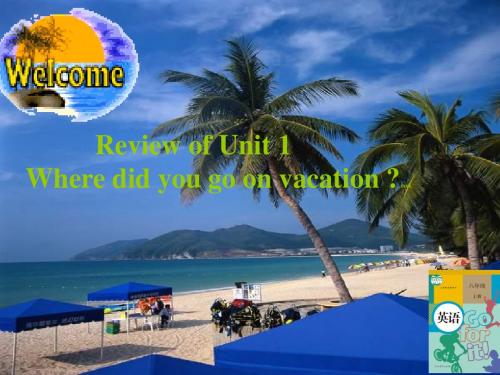
1.most of the time意为“大部分时间”,其中most 为代词,意为“大部分;大多数”。 拓展most of…意为“……中的大多数”,它作主 语时,谓语动词取决于most of后所修饰的名词。 a. Most of us are going to the park. 我们大多数人要 去公园。 2.Still no one seemed to be bored. 仍然没有 人感到烦闷。 1)seem意为“好像;似乎;看来”,是个连系 动词,构成的短语有:
复合不定代词:
some
人 someone
any
every
no
anyone everyone no one
物 something anything everything nothing
few与little 的区别
肯定 可数 不可数 a few a little 否定 few little 许多 quite a few/not a few quite a little/ not a little
Where did you go on vacation?
visited a museum
went to the mountains
went to the movies
stayed at home
visited grandparents
go on vacation 1.去度假 2.待在家里 stay at home went to the mountains 3.去爬山 go to the beach 4.去海滩 5.参观博物馆 visit the museums 6.看望我叔叔 visit my uncle 7.去参加夏令营 go to the summer camp 8.一些特别的东西 something/ anything interesting 9. 一些有趣的地方 anywhere interesting 10.为……而学习 study for tests
人教版英语八年级上册Unit-1-where-did-you-go-on-vacation练习题

Unit 1 where did you go on vacation? Ⅰ.写出下列动词的过去式1.bring2.build3.buye5.cost6.do(does)7.drink 11.eat12.feed13.feel14.find15.forget16.get17.go21.have(has)22.keep23.know24.learn25.make26.think27.meet8.sleep9.sing10.see 18.speak19.write20.swim28.take29.teach30.tellⅡ.英汉短语互译1呆在家10 玩得开心19 walk around2 参观博物馆11 因为20 over an hour3 去海滩12 照相21 too many4 去度假13 一碗22 much too5 和某人一起出14 visit sb. 23 come up6 在乡下15 study for a test 24 quite a few7 到达某地16 记日记8 决定做某事17 为某人买某物9 感觉像18 so.....thatⅢ. 用所给词的适当形式填空1 There____(be)many old houses here last year.2 I ____(meet)an actor yesterday.3 She usually ____(have)lunch at home. But yesterday she _____(have)it at school.4 I___(go)to the New York City with my mother last year.5 They____(take)lots of photos last week.6.My daughter ___(not go)to school yesterday?7.----___she ___(practice)her guitar yesterday?-----No, she ___ .8.----What ___you ___(do)last weekend?-----I ___(study)math Saturday.Ⅳ单项选择()1.Was there a school here last year ? No,______.A. There isn’t B there weren’t C there was D there wasn’t ()2.Would you like_____to eat ?A anythingB nothingC somethingD any thing()3.---Where____your grandparents go on their vacation?---They____to the beach.A do, goB did, wentC did, goD do , went()4. Did your mother buy____for you ? ----Yes, she did.A. anything specialB. special anythingC. special something ()5. Don’t worry. There is____time to go.A. LittleB. fewC. a littleD. a few()6.I have nothing to do but____TV.A. watchesB. watchC. watchingD. watched()7. The story is___. I feel so____to read it.A. exciting, excitedB. exciting, excitingC. excited, exciting ()8. Mother bought____eggs yesterdayA. too muchB. much tooC. too many()9. He___the taxi back___here yesterday.A.took, toB. take, toC. took, /D. takes, /()10. My father bought a bike___me?A. withB. toC. forD. At()11. He runs_____.A. enough quicklyB. quickly enoughC. quick enough()12. Last night he___a movie_____animals.A.watches, aboutB. saw, toC. watched, forD. watched, about ()13. Lucy doesn’t feel like_____today ?A. to walkB. walkC. walkingD. walked()14. I hope she can____my uncle with me this week.A. visitB. visitingC. visitsD. visited()15. Why don’t you____your son to the party?A. bringB. takeC. brought D took()16. Nobody__what the future will be like.A knowB knewC knowsD knowing()17. Who did you go to the movie______? ------nobody, I went alone.A withB aboutC forD from()18.______dinner, we had dumplings and chicken.A. InB. ForC. OfD. On()19. My best friend and I enjoyed____around the park.A. walkB. to walkC. walksD. Walking()20. They decide____on May 1st.A.to go fishB.go fishingC.to go fishingD.go fish()21. Yesterday she_____a famous singer and_____her autograph.A.meet, getB.meet, gotC.meeted, gotD.met, got()22. She had fun____on her day____.A.swim,offB.swims, offC.swimming, offD. Swimming, of ()23. How about_____a drink?A.haveB.to haveC.hadD.having()24. —what did you buy for your daughter?—I bought ________, because I cou ldn’t find ________ she likes.A. something, anythingB. anything, somethingC. nothing, anythingD. something, nothing()25. I didn’t go to the mountain_____the bad weather.A.soB.becauseC.because ofD.but()26. She didn’t______me about it.A.toldB.tellC.tellingD.tells()27. Don’t forget____your homework tomorrow.A.bringB.to bringC.broughtD.bringing()28. Mom often tells me____computer games too much.A.not playB.not to playC.not playingD.a play Ⅴ句型转换1.I did my homework yesterday. (改为否定句)I __ ____my homework yesterday.2.She went to New York on vacation(就划线部分提问)___did she___on vacation?3.Lily visited the Great Wall last Sunday.(改为一般疑问句)___Lily___the Great Wall last Sunday?4.He was at home this time yesterday.(改为一般疑问句) ___he at home this time yesterday?5. The students had fun in the park.(改为同义句)The students ___ ___ ___ ___in the park.6.Lucy did her homework yesterday evening.(改为否定句) Lucy ___ ___ ___homework yesterday evening.7.Jim went to the beach last Sunday.(对划线部分提问)___ ___ Jim ___last Sunday?8.They played basketball yesterday.(对划线部分提问)___ ___ they play basketball?9.There was some water in the bottle.(改为否定句) There ___ ___ water in the bottle。
2013年八年级英语上册-Unit-1-Where-did-you-go-on-vacation-Section-A-3a-3c.
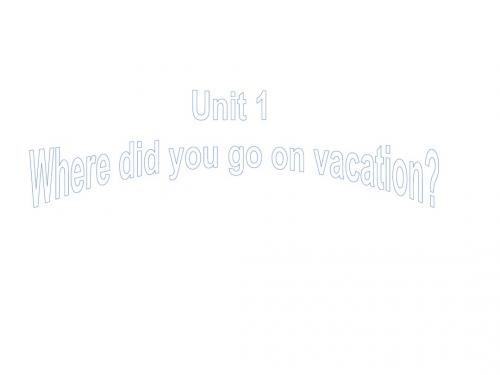
他自己 她自己 它自己
ourselves yourselves
themselves
我们自己 你们自己
他们自己
1. Did you buy anything for yourself? 你为你自己买什么东西了吗?(做介词宾语) 2. The old man taught himself English. 那位老人自学英语。(做动词宾语)
1. 你去了什么地方去度假? _W__h_e_r_e __d__id__ you go on _v_a_c_a_t_io_n__? 2. 我去了纽约市。 I _w_e_n_t___ _t_o__ New York City. 3. 你和别的什么人一起去的吗? _D_i_d___ _y_o_u___ go out with _a_n_y_o_n_e__?
( ) 1. I’m hungry. I want ___B___ to eat. A. anything B. something
C. everything D. nothing
( ) 2. —Do you have __D____ to say for yourself?
—No, I have ______ to say.
smell: 闻起来 ~ sweet
look:看起来 ~ beautiful/handsome/cute
sound: 听起来 ~ good/wonderful feel:摸起来 ~cold/warm/soft(软)
感官动词(系动词)+ 形容词
2.have a good time: 玩的开心、过得愉快
问题是李雪鹏没有钱。
The problem is that Li Xuepeng has no money. 唯一的问题是今天的报纸上没有什么有趣的东西。
人教版英语八年级上册UNIT1:Where-did-you-go-on-vacation教学设计

Where did you go on vacation?教学设计(Period1)一、教学目标在本节课结束时,学生将能够:学习本单元的重点短语;用一般过去时就假期活动进行问答;能够口头介绍自己假期的旅游经历等。
知识与能力:通过本课学习,学会使用目标语言进行询问并描述假期活动。
同时在描述自己国内假期活动中学会爱国。
过程与方法:采用二人对话、头脑风暴、小组活动、听力活动和预测听力内容的学习策略,PPT、图片或制作课件等来展开课堂教学、二人对话、小组活动、口头作文等进行谈论假期的经历” 的课堂教学和练习。
利用视频、“询问和本单元的教学法建议:短语教学采取情景引入展开启发式的教学方式,让学生在思考中输出自己的语言,并在句型中学会运用;语音教学让学生进行听对话并跟读听力内容,并在模仿中内化语言,输出语言;口语教学采取pair work 、 report 和口头作文对学生进行教学;听力教学采取听音填表和听音打钩等的方式进行教学,训练学生的听力能力;口头作文教学通过图片启发学生就自己的假期经历进行简单输出;语法教学让学生模仿给出的过去时句子进行模仿,并教师及时纠正。
情感态度与价值观:通过参与课题教学活动,增进同学之间的了解和友情并学会在英语交流中注意他人的情感,同时通过谈论祖国的风景名胜而增强爱国情感。
二、教学重难点教学重点:学生学习并掌握一般过去时的疑问句及答语。
教学难点:帮助学生建立使用助动词did 提问的意识及对谓语动词原形的使用。
三、教学策略语音教学让学生跟读听力材料进行模仿式操练;短语教学采取视频引入话题然后进行启发式教学,并在对话中运用;口语教学采取 pair work 问答式的口语交际活动或小组活动互相操练;听力教学采取听音填表和听音打钩等方式;口头作文教学以对话活动,小组汇报,口头作文等进行口头作文练习;语法教学通过模仿听力材料进行对话练习,在教师的纠正中培养正确的一般过去时语法意识。
四、教学过程Step 1: Lead in通过播放视频引出本节课话题“假期经历”,复习有关假期活动的短语。
2013年新人教版(go_for_it)八年级上册英语单词
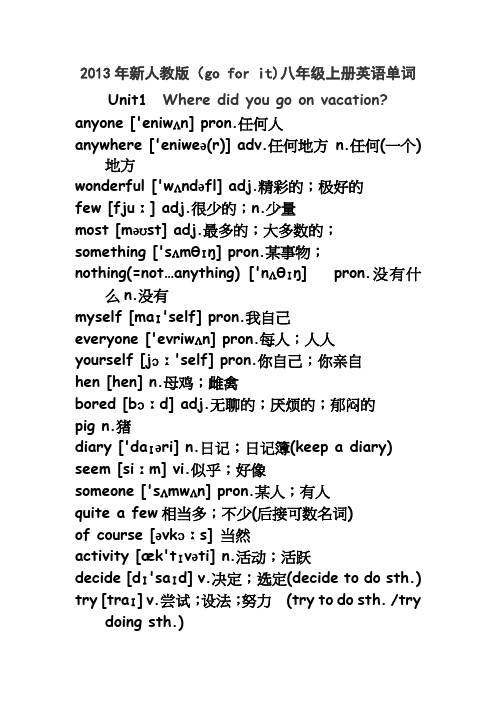
2013年新人教版(go for it)八年级上册英语单词Unit1 Where did you go on vacation? anyone ['eniwʌn] pron.任何人anywhere ['eniweə(r)] adv.任何地方 n.任何(一个)地方wonderful ['wʌndəfl] adj.精彩的;极好的few [fjuː] adj.很少的;n.少量most [məʊst] adj.最多的;大多数的;something ['sʌmθɪŋ] pron.某事物;nothing(=not…anything) ['nʌθɪŋ] pron.没有什么n.没有myself [maɪ'self] pron.我自己everyone ['evriwʌn] pron.每人;人人yourself [jɔː'self] pron.你自己;你亲自hen [hen] n.母鸡;雌禽bored [bɔːd] adj.无聊的;厌烦的;郁闷的pig n.猪diary ['daɪəri] n.日记;日记簿(keep a diary) seem [siːm] vi.似乎;好像someone ['sʌmwʌn] pron.某人;有人quite a few相当多;不少(后接可数名词)of course [əvkɔːs] 当然activity [æk'tɪvəti] n.活动;活跃decide [dɪ'saɪd] v.决定;选定(decide to do sth.) try [traɪ] v.尝试;设法;努力 (try to do sth. /try doing sth.)bird [bɜːd] n.鸟;禽paragliding ['pærəɡlaɪdɪŋ] n.空中滑翔跳伞bicycle ['baɪsɪk l] n.自行车building ['bɪl dɪŋ] n.建筑物trader ['treɪdə(r)] n.商人;商船wonder ['wʌn də(r)] v.惊奇;想知道;怀疑difference ['dɪf rəns] n.差异;不同top [tɒp] n.顶部;顶wait [weɪt] v.等;等待(wait for)umbrella [ʌm'brelə] n.伞;雨伞wet [wet] adj.湿的;雨天的below [bɪ'ləʊ] prep.低于;在...下面adv.在下面as [əz] conj.如同;像...一样enough [ɪ'nʌf] adj.足够的adv.足够地;充分地duck [dʌk] n.鸭肉;鸭hungry(反full) ['hʌŋɡri] adj.饥饿的;渴望的feel like(doing sth.)想要dislike [dɪs'laɪk] v.不喜欢;厌恶 n.不喜爱;厌恶;反感because of因为;由于have a good time=enjoy oneself=have fun(doing sth.)玩得痛快Unit2 How often do you exercise? housework ['haʊswɜːk] n.家务劳动hardly ['hɑːdli] adv.几乎不;简直不;刚刚ever ['evə(r)] adv.曾经;在任何时候once [wʌns] adv.一次;曾经twice [twaɪs] adv.两倍;两次Internet ['ɪntənet] n.因特网program ['prəʊɡræm] n.节目;程序;课程;节目单full [fʊl] adj.满的;充满的;完全的swing [swɪŋ] n.摇摆;秋千v.摇摆;旋转maybe ['meɪbi] adv.或许;也许;可能swing dance摇摆舞least [liːst] adj.最小的;最少的at least至少hardly ever很少;几乎从不;难得junk n.垃圾;废旧杂物coffee ['kɒfi] n.咖啡;咖啡色health [helθ] n.健康;人的身体或精神状态result [rɪ'zʌl t] .结果;后果percent [pə'sent] adj.百分之...的online [ˌɒn'laɪn] adj.在线的adv.在线地television ['telɪvɪʒn] n.电视机;电视节目although [ɔːl'ðəʊ] conj.虽然;尽管;然而;可是through [θruː] prep.穿过;凭借;一直到body ['bɒd i] n.身体mind [maɪn d] .头脑;想法;意见;心思such [sʌtʃ] adj.这样的;如此的together [tə'ɡeðə(r)] adv.共同;一起die [daɪ] v.死;枯竭;消失writer ['raɪtə(r)] n.作者;作家dentist ['dentɪst] n.牙科医生magazine ['mæɡəziːn] n.杂志however [haʊ'evə(r)] adv.然而;无论如何;不管多么than [ðən] conj.比almost ['ɔːlməʊst] adv.几乎;差不多none [nʌn] pron.没有人;没有任何东西,毫无less [les] adj.更少的;较少的point [pɔɪnt] n.看法;要点;重点;小数点;目标;分数such as例如;诸如junk food n.垃圾食品;无营养食品more than超过;多于;不仅仅;非常less than不到;少于Unit3 I'm more outgoing than my sister. outgoing ['aʊtɡəʊɪŋ] adj.外向的better ['betə(r)] adj.更好的;较好的 adv.更好地loudly ['laʊdli] adv.大声地;高声地;花俏地quietly ['kwaɪətli] adv.安静地;悄悄地;平静地hard-working [hɑːd'wɜːkɪŋ] adj.勤勉的;努力工作的competition [ˌkɒmpə'tɪʃn] n.竞争;比赛fantastic [fæn'tæstɪk] adj.极好的;了不起的which adj.哪一个;哪一些pron.哪一个;哪些clearly ['klɪəli] adv.清楚地;显然地win [wɪn] v.赢;赢得;获胜;获得n.胜利though conj.虽然;尽管;adv.不过care about关心talented ['tæləntɪd] adj.有才能的;有天赋的truly ['truːli] adv.真实地;真诚地;正确地care [keə(r)] v.关心;担忧;照顾;在乎serious ['sɪəriəs] adj.严肃的;严重的;庄重的mirror ['mɪrə(r)] n.镜子;反映necessary ['nesəsəri] adj.必要的;必然的both [bəʊθ] adj.两者都pron.两者should [ʃəd] aux.应该;可能;应当;将要touch [tʌtʃ] vt.触摸;感动reach [riːtʃ] v.到达;伸出;达成;取得联系;延伸;(伸手)去够heart [hɑːt] n.心脏;内心fact [fækt] n.事实;真相;实际break [breɪk] v.打碎;折断;违背;解决;中断laugh [lɑːf] v.发笑;笑;嘲笑 n.笑声;笑;笑料similar ['sɪmələ(r)] adj.类似的share [ʃeə(r)] vt.分享,共享;分配;共有loud [laʊd] adj.大声的;adv.大声地;响亮地primary ['praɪməri] adj.最初的,最早的be different from和...不同information [ˌɪnfə'meɪʃn] n.信息;情报;资料;通知as long as只要bring out拿出;推出the same as与...同样的in fact事实上;实际上;确切地说be similar to类似于;与...相似Unit4 What's the best movie theater? theater ['θɪətə] n.剧场;电影院;戏院comfortable ['kʌmftəbl] adj.舒适的;充裕的seat [siːt] n.座位;screen [skriːn] n.屏幕;银幕close [kləʊs] v.关;合拢;不开放;停业worst [wɜːst] adj.最坏的;最差的cheaply ['tʃiːpli] adv.廉价地;粗俗地song [sɒŋ] n.歌曲;歌唱choose [tʃuːz] v.选择;决定carefully ['keəfəli] adv.小心地,认真地reporter [rɪ'pɔːtə(r)] n.记者fresh [freʃ] adj.新鲜的;清新的comfortably ['kʌmftəbli] adv.舒服地;容易地;充裕地worse [wɜːs] adj.更坏的;更差的service ['sɜːvɪs] n.服务pretty ['prɪti] adv.相当地adj.漂亮的menu ['menjuː] n.菜单act [ækt] v.行动;表演meal [miːl] n.一餐;膳食so far到目前为止;迄今为止no problem没什么;不客气creative [kri'eɪtɪv] adj.创造的,创造性的;performer [pə'fɔːmə(r)] n.表演者;执行者talent ['tælənt] n.天赋;才能,才艺;common ['kɒmən] adj.常见的;共同的;普通的magician [mə'dʒɪʃn] n.魔术师;术士beautifully ['bjuːtɪfli] adv.美丽地;完美地;role [rəʊl] n.作用;角色winner ['wɪnə(r)] n.获胜者prize [praɪz] n.奖品;奖金everybody ['evribɒdi] pron.每人;人人example [ɪɡ'zɑːmpl] n.例子;榜样poor [pɔː(r)] adj.可怜的;贫穷的seriously ['sɪəriəsli] 严重地,严肃地give [ɡɪv] v.给;赠予;送crowded ['kraʊdɪd] adj.拥挤的have…in common有相同特征all kinds of各种各样;各种类型be up to是…….的职责;由…….决定play a role发挥作用;有影响makeup编造for example例如take…seriously认真对待Unit5 Do you want to watch a game show? sitcom ['sɪtkɒm] n.情景喜剧 (= situation comedy) news [njuːz] n.新闻;消息soap [səʊp] n.肥皂;肥皂剧educational [ˌedʒu'keɪʃənl] adj.教育的;有教育意义的plan [plæn] n.计划;方法v.打算;计划hope [həʊp] .希望;期望;盼望n.希望discussion [dɪ'skʌʃn] n.讨论;谈论stand [stænd] v.站立;忍受happen ['hæpən] vi.发生;碰巧;出现;偶遇may [meɪ] aux.可以,能够;可能,也许expect [ɪk'spekt] v.预期;期待;盼望joke [dʒəʊk] n.笑话;玩笑v.说笑话;开玩笑comedy ['kɒmədi] n.喜剧;滑稽;幽默事件find out查明、弄清meaningless ['miːnɪŋləs] adj.无意义的;不重要的action ['ækʃn] n.行为;活动cartoon [kɑː'tuːn] n.卡通;漫画culture ['kʌltʃə(r)] n.栽培;文化;教养famous ['feɪməs] adj.著名的;有名的appear [ə'pɪə(r)] vi.出现;出版;显得become [bɪ'kʌm] v.变成;成为rich [rɪtʃ] adj.富有的;富饶的;丰富的successful [sək'sesfl] adj.成功的;圆满的might [maɪt] aux.可能;也许;may的过去式main [meɪn] adj.主要的;最重要的reason ['riːzn] n.原因;理由film [fɪlm] n.电影unlucky [ʌn'lʌki] adj.倒霉的;不幸的;不吉利的lose [luːz] vt.丢失;失败vi.失败ready ['redi] adj.准备好的;乐意的character ['kærəktə(r)] n.个性;品质;人物;simple ['sɪmpl] adj.简单的;朴素的;单纯的;笨的army ['ɑːmi] n.军队;陆军;一大批action movie动作片be ready to愿意迅速做某事dress up装扮;乔装打扮take sb.’s place代替;替换do a good job工作干得好;做得好Unit6 I'm going to study computer science. doctor ['dɒktə(r)] 医生engineer [endʒɪ'nɪr] 工程师violinist [ˌvaɪə'lɪnɪst] 小提琴手pilot ['paɪlət] 飞行员pianist ['pɪənɪst] 钢琴家scientist ['saɪəntɪst] 科学家college ['kɑːlɪdʒ] 大学education [ˌedʒu'keɪʃn] 教育medicine ['medsn] 药,医学university [ˌjuːnɪ'vɜːrsəti] 大学,高等学府article ['ɑːrtɪkl] 文章,论文send [send] 邮寄,发送grow up长大成长computer programmer计算机管理员be sure about确信make sure确保resolution [ˌrezə'luːʃn] 决心,决定foreign ['fɔːrən] 外国的able [ˌebəl] 能够discuss [dɪˌskʌs] 讨论,商量promise [ˌprɑmɪs] 承诺,诺言beginning [bɪˌɡɪnɪŋ] 开头,开端improve [ɪmˌpruv] 改进,改善physical ['fɪzɪkl] 身体的self-improvement [selfɪmp'ruːvmənt] 自我改进,自我提高hobby ['hɑːbi] 业余爱好own [oʊn] 自己的,本人的,拥有personal ['pɜːrsənl] 个人的,私人的relationship [rɪ'leɪʃnʃɪp] 关系write down写下have to do with关于;与……有关系take up学着做;开始做agree with同意be able to能够做某事Unit 7 Will people have robots? paper ['peɪpər] 纸pollution [pə'luːʃn] 污染;污染物prediction [prɪ'dɪkʃn] 预测future ['fjuːtʃər] 未来pollute [pə'luːt] 污染environment [ɪn'vaɪrənmənt] 环境planet ['plænɪt] 行星earth [ɜːrθ] n.地球;泥土plant [plænt] 种植,植物part [pɑːrt] 参加,部分peace [piːs] 和平sky [skaɪ] 天空play apart参与astronaut ['æstrənɔːt] 宇航员apartment [ə'pɑːrtmənt] 公寓房间rocket ['rɑːkɪt] 火箭;space [speɪs] .空间;太空even ['iːvn] 甚至;愈加human ['hjuːmən] 人的;n.人;人类servant ['sɜːrvənt] 仆人dangerous ['deɪndʒərəs] 危险的already [ɔːl'redi] 已经factory ['fæktri] 工厂believe [bɪ'liːv] 相信disagree [ˌdɪsə'ɡriː] 不同意shape [ʃeɪp] 形状fall [fɔːl] 倒塌;跌倒possible ['pɑːsəbl] 可能的probably ['prɑːbəbli] 大概;或许;很可能holiday ['hɑːlədeɪ] 假日word [wɜːrd] 单词;space station太空站over and over again多次;反复地hundreds of许多;大量;成百上千fall down突然倒下;跌倒;倒塌look for寻找;寻求Unit 8 How do you make a banana milk shake? blender 搅拌器;果汁机peel vt.剥落;削皮pour 倒;倾倒yogurt 酸奶;honey 蜂蜜watermelon 西瓜spoon 勺,调羹add 增加finally 最后,最终sale 盐sugar 糖cheese 干酪,奶酪popcorn 爆米花corn 玉米,谷物machine 机器sandwich 三明治butter 黄油,奶油turkey 火鸡lettuce 莴苣,生菜piece [piːs] 件;篇;片;块;traditional [trə'dɪʃənl] 传统的traveler ['trævlə] 旅行者England ['ɪŋɡlənd] 英格兰;英国celebrate ['selɪbreɪt] 庆祝;庆贺pepper ['pepər] 胡椒粉;辣椒oven ['ʌvn] 烤箱;烤炉cover ['kʌvər] 遮盖,盖子,gravy ['ɡreɪvi] 肉汁;肉汤serve [sɜːrv] 接待,服务temperature ['temprətʃər] 温度,气候Unit 9 Can you come to my party?prepare [prɪ'per] v.预备;准备exam [ɪɡ'zæm] 考试available [ə'veɪləbl] 可得到的;有空的;hang [hæŋ] 悬挂;(使)低垂until [ən'tɪl] 直到...的时候;直到…为止catch [kætʃ] 赶上;抓住;捕捉invite [ɪn'vaɪt] 邀请accept [ək'sept] 接受;refuse [rɪ'fjuːz] 拒绝invitation [ˌɪnvɪ'teɪʃn] 邀请;邀请函reply [rɪ'plaɪ] 回答,回复forward ['fɔːrwərd] 转交;发送,向前的delete [dɪ'liːt] 删除preparation [ˌprepə'reɪʃn] 准备,准备工作opening ['oʊpnɪŋ] 开幕式,落成典礼guest [ɡest] 客人concert ['kɑːnsərt] 音乐会headmaster [ˌhed'mæstər] 校长event [ɪ'vent] 大事,公开活动calendar ['kælɪndər] 日历,日程表Unit10 If you go to the party,you 'll have a greattime!video ['vɪdioʊ] 录像,录像带organize ['ɔːrɡənaɪz] 组织,筹备chocolate ['tʃɑːklət] 巧克力upset [ʌp'set] 难过,失望advice [əd'vaɪsɪ] 劝告,建议travel ['trævl] 旅行agent ['eɪdʒənt] 代理人,经纪人expert ['ekspɜːrt] 专家,能手teenager ['tiːnˌeɪdʒə] 青少年normal ['nɔːrml] 正常的unless [ən'les] 除非,如果不certainly ['sɜːrtnli] 当然,肯定wallet ['wɑːlɪt] 皮夹,钱包worried ['wɜːrid] 担心的,烦恼的angry ['æŋɡri] 生气的,发怒的careless ['kerləs] 粗心的,不小心的understanding [ˌʌndər'stændɪŋ] 善解人意的,体谅人的trust [trʌst] 相信,信任mistake [mɪ'steɪk] 错误,失误careful ['kerfl] 小心的,细致的advise [əd'vaɪz] v劝告,建议solve [sɑːlv] 解决;解答experience [ɪk'spɪriəns] 信任,经历halfway [ˌhæf'weɪ] 中途的adv.半路地else [els] 别的,其他的。
新目标版八年级英语上册:Unit-1-where-did-you-go-on-vacation全单元

Unit1 where did you go on vacation?(Section A 1a—1c)预习检测:1.写出下列动词的过去式:go _______________ stop ___________________ visit _____________study____________do __________ride____________ take_____________ drive__________ arrive___________walk______________________ sleep ___________keep___________ get___________ 2.翻译下列短语:参加夏令营______________________________ 去大山________________________________去海滩_______________________________参观博物馆________________________________呆在家_______________________________ 拜访我的叔叔_____________________________任何特殊的事情_______________________________外出______________________________语法回顾:动词过去式构成规则用词的正确形式填空1.I _________( like ) oranges when I was young(年轻的).But now I __________(not like)them.2. My mother often _________( stay) at home on Sundays, but last Sunday she_________( not stay) at home ,she _________(go) to the park.3. Wei Hua __________ (have)a busy day yesterday.4.He ___________(visit) the Great Wall(长城)last year.5.We____________(have) a good time yesterday.6.We often __________(go) to school by bus last year.7.I __________(live)in the village when I was a child.9.Mike__________(see) a big tiger in the park last year.10.Sam___________ (do) the housework yesterday.11.________(do) you _________(enjoy) yourself yesterday?12.________(do)you __________(play) the violin in the art room yesterday?No, I didn't. I___________(draw)some pictures there.选择填空( ) 1. She watered the flowers _____. A tomorrow B sometimes C yesterday morning( ) 2.What ____ Mike do last weekend ? A do B does C did( ) 3. I ___ my room last Sunday. A cleaned B clean C am cleaning( ) 4. I often help my mother _____ housework. A does B did C do( ) 5. _____ you _____ TV last night. A Do, watch B Did, watch C Did, watched( ) 6. Did your father write an e-mail yesterday? A Yes, he did. B Yes, he does C No, he don’t( ) 7.They _____ on a trip in February ,2007. A are going B going C went( ) 8.We’re going to _____mountains tomorrow. A climb B climbed C climbing( ) 9. ____ he ____ football two days ago? A Does , play B Did , played C Did , play( ) 10.Good afternoon, Miss Lee. How does Mike feel? He’s tired . He ____ a lot of work ______ .A does , this morningB do , this morningC did , this mornUnit1 where did you go on vacation?(Section A 2a—3c)小试牛刀:1. - --Do you have ____________ to eat? (anything /something)---No, I don’t have ________________to eat. (anything /something)2. Would you like ____________ to eat? (anything /something) –Yes, please.3. Something _______(is/ are /am) wrong with my watch.4. There is ___________(something interesting / interesting something) in the news paper.五、反馈检测:(一)汉译英:1上个月_________________ 2.瀑布______________ 3.相当多_________________4.拍照/照相_________________5.大多数时间_________________6.第一次_________________.7.认为,思考________________8.很久没有见面!______________________________________9.那是我第一次去三亚。
八年级英语上册《Unit_1_Where_did you go on vacation Section B 1a-2a》知识点导学案
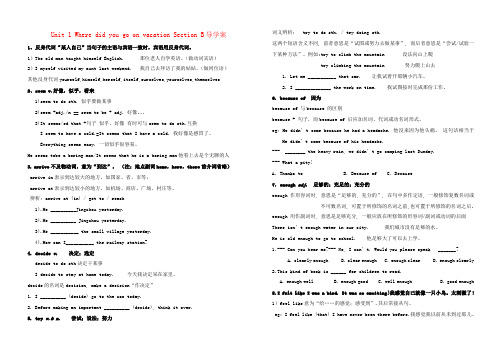
Unit 1 Where did you go on vacation Section B导学案1、反身代词“某人自己”当句子的主语与宾语一致时,宾语用反身代词。
1)The old man taught himself English. 那位老人自学英语。
(做动词宾语)2)I myself visited my aunt last weekend. 我自己去拜访了我的姑姑。
(做同位语)其他反身代词yourself,himself,herself,itself,ourselves,yourselves,themselves2、seem v.好像,似乎,看来1)seem to do sth. 似乎要做某事2)seem +adj./n == seem to be + adj. 好像。
3)It seems/ed that +句子似乎,好像有时可与seem to do sth.互换I seem to have a cold.=It seems that I have a cold. 我好像是感冒了。
Everything seems easy. 一切似乎很容易。
He seems tobe a boring man/It seems that he is a boring man他看上去是个无聊的人3. arrive不及物动词,意为“到达”。
(注:地点副词home,here,there前介词省略)arrive in表示到达较大的地方,如国家、省、市等;arrive at表示到达较小的地方,如机场、商店、广场、村庄等。
辨析:arrive at (in) / get to / reach1).He __________Jingzhou yesterday.2).He __________ Jingzhou yesterday.3).He ___________ the small village yesterday.4).How can I___________ the railway station?4. decide v.决定;选定decide to do sth决定干某事I decide to stay at home today. 今天我决定呆在家里。
八年级英语Unit1-where-did-you-go-on-vacation-教案

八年级上Unit 1 Where did you go on vacation? 一.Phrases1。
go on vacation去度假2. stay at home待在家里3。
go to the mountains去爬山4. go to the beach去海滩5。
visit museums 参观博物馆6. go to summer camp去参观夏令营7。
quite a few相当多8. study for为……而学习9. go out出去10。
most of the time大部分时间11。
taste good尝起来很好吃12。
have a good time玩得高兴13。
of course当然14。
feel like给……的感觉;感受到15。
go shopping去购物16. in the past在过去17。
walk around四处走走18. because of因为19。
one bowl of… 一碗……20。
the next day第二天21. drink tea喝茶22. find out找出;查明23。
go on继续24. something important重要的事25. up and down上上下下26. come up出来27. take photos照相二.句型集萃1。
buy sth. for sb. / buy sb。
sth. 为某人买某物2. taste + adj. 尝起来……3。
seem+(to be)+ adj。
看起来……4。
keep doing sth。
继续做某事5。
arrive in+大地点/ arrive at+小地点到达某地6。
tell sb. (not) to do sth。
告诉某人(不要)做某事7。
try doing sth. 尝试做某事/ try to do sth. 尽力去做某事8。
decide to do sth。
决定去做某事9. forget doing sth. 忘记做过某事/10. forget to do sth. 忘记做某事11. enjoy doing sth。
八年级英语上册Unit1_where_did_you_go_on_vacation_SectionA2(3a-3c)
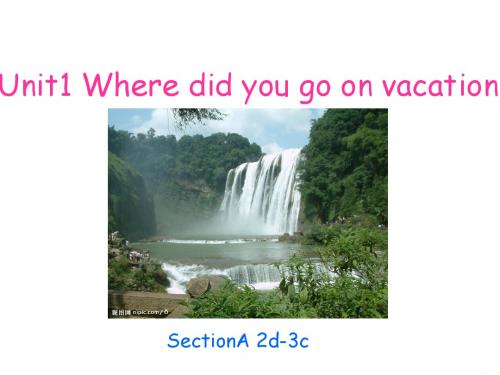
How was the food?
Did everyone have a good time.
Everything tasted really good!
Oh,yes.Everything was excellent.
语法要点:复合不定代词
• 不定代词some, any, no, every与-one, -body, 成复合代词。我们称之为复合不定代词。 -thing构
read anything interesting visit anyone in your family buy anything keep a diary Report like this:
In our group, everyone ate something at a restaurant …
3b
3c
Ask your group questions about their last vacation. Then tell the class your results.
Everyone Someone No one
Did you… eat anything at a restaurant?
3a
Fill in the blanks with the words in the box And practice the conversation
Linda: Did you do________ fun on your vacation, Alice? anything Alice: yes, I did. I went to Sanya. anyone Linda: How did you like it? something Alice: Well, it was my first time there. So __________ was really interesting. anything everything everything anyone Linda: Did you go with__________? Alice: Yes, I did. I went with my sister. nothing Linda: Did you go shopping? Alice: Of course. I bought _________ for my parents, but something __________ for myself. nothing anything Linda: Why didn’t you buy__________ for yourself? Alice: I didn’t really see anything I liked. _________
八年级英语上册Unit-1-Where-did-you-go-on-vacation-知识点归纳
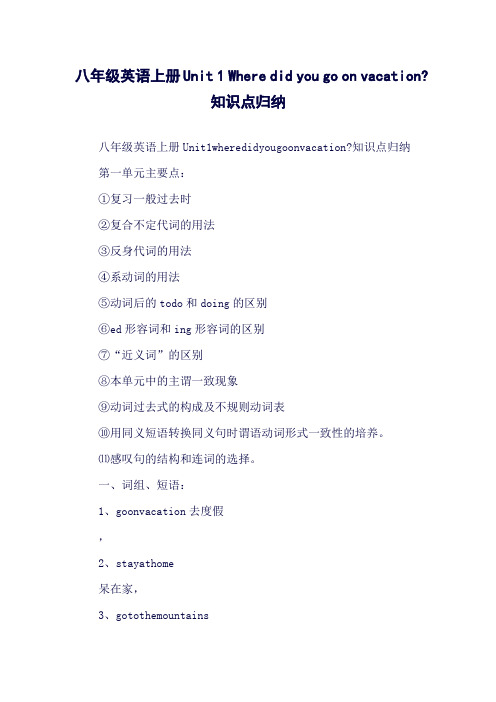
八年级英语上册Unit 1 Where did you go on vacation?知识点归纳八年级英语上册Unit1wheredidyougoonvacation?知识点归纳第一单元主要点:①复习一般过去时②复合不定代词的用法③反身代词的用法④系动词的用法⑤动词后的todo和doing的区别⑥ed形容词和ing形容词的区别⑦“近义词”的区别⑧本单元中的主谓一致现象⑨动词过去式的构成及不规则动词表⑩用同义短语转换同义句时谓语动词形式一致性的培养。
⑾感叹句的结构和连词的选择。
一、词组、短语:1、goonvacation去度假,2、stayathome呆在家,3、gotothemountains上山/进山,4、gotothebeach到海边去,5、visitmuseums参观博物馆,6、gotosummercamp去夏令营,7、quiteafew相当多,8、studyfor为……学习,9、goout出去,10、mostofthetime大部分时间/绝大多数时间,11、tastegood尝起来味道好,12、haveagoodtime玩的开心,13、ofcourse当然可以,14、feellike感觉像……/想要,15、goshopping购物,16、inthepast在过去,17、walkaround绕……走,18、toomany太多(可数名词前面),19、becauseof因为,20、onebowlof一碗……,21、findout查出来/发现,22、goon继续,23、takephotos照相,24、somethingimportant重要的事情,25、upanddown上上下下,26、comeup出来二、重要句子(语法):wheredidyougoonvacation?你到哪里去度假了?IwenttoNewyorkcity.我去了纽约城Didyougooutwithanyone?你出去带人吗?No,Noonewashere.Everyonewasonvacation.不,没有人在这儿。
2013新人教版八年级上英语unit1-4
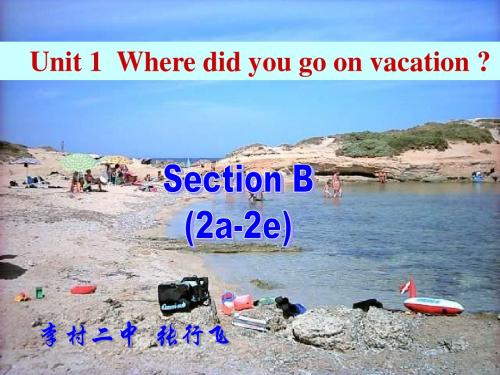
“愉快的;快乐 的”。 你发现什么活动让人快乐?
Malaysia
Penang
Last summer Jane …
beach
Paragliding Malaysian yellow noodles
Georgetown
new buildings and old buildings
houses of Chinese traders
Weld Quay
walk up to the top take the train
Penang Hill
got to the top
an umbrella wet and cold
2b
任务一:Fast reading
Did Jane have a good time on Monday? What about on Tuesday?
It was exciting. she felt like a bird. They enjoyed walking around It rained, they were wet and cold.
Had one bowl of rice and some fish
Yes, she did.
2d Complete the conversation about Jane's trip.
4.I felt like I was a bird. It was so exciting! 我感觉自己就像一只小鸟。太刺激了! 2)辨析:exciting与excited exciting意为“令人兴奋的,使人激动的”.可作定语和 表语,作表语时主语通常为物。 excited意为“感到兴奋的,激动的”,常作表语, 主语通常为人。
8年级新教材英语上册Unit1-Where-did-you-go-on-vacation?课件
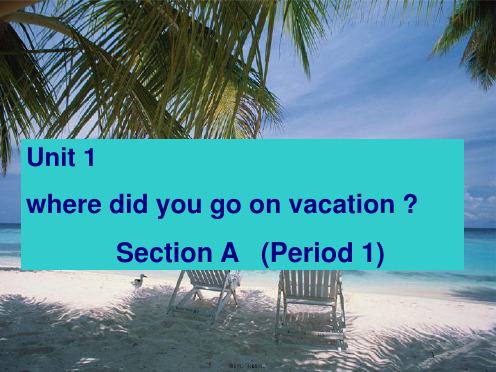
play soccer go to the beach
go to the movies stay at home
do some reading study for the test
第6页,共65页。
New York City
Where did he go on vacation ? He went to New York City .
第14页,共65页。
went to summer camp
1a Match the words with the pictures.
1. stayed at home __f_
2.went to New York City
b
__b__
3. visited my uncle___g
a
4. went to summer camp
Alice: Yes, I did. I went to Sanya.
Linda: How did you like it?
Alice: Well, it was my first time there, so ____e_v_ewryathsing
really interesting.
Linda:
第24页,共65页。
Unit 1
where did you go on vacation ? Period 2
第25页,共65页。
Where did you go on vacation?
I went to New York City.
Did you go out with anyone?
No. No one was here. Everyone was on vacation.
八年级英语上册Unit 1 Where did you go on vacation-重点句型汇总

八年级英语上册Unit 1 Where did you go on vacation?重点句型汇总
八年级英语上册Unit 1 Where did you go on vacation?
重点句型汇总
Unit 1 Where did you go on vacation? 1.——Where did you go on vacation? 你到哪里去度假了?
——I went to New我去了纽约城。
2.——Did you go out with anyone? 你出去带人吗?——No, No one waveryone was on vacation. 不,没有
人在这儿。
大家度去度假了。
3.——Did you buy anything special? 你买了什么特别
的东西吗?
——Yes, I bouggather. 对,我给父亲买了一些东西。
4.——How wad? 食物怎么样?
——Everything tasted really good.每一样东西真的都
好吃。
5.——Did evave a good time?大家玩的开心吗?——verything was excellent.对,一切都很精彩。
6.There wag much to dvening but read.
晚上除了读书以外无事可做。
八年级英语上册Unit 1 Where did you go on vacation-知识点归纳

八年级英语上册Unit 1 Where did you go on vacation?知识点归纳八年级英语上册Unit1wheredidyougoonvacation?知识点归纳第一单元主要点:①复习一般过去时②复合不定代词的用法③反身代词的用法④系动词的用法⑤动词后的todo和doing的区别⑥ed形容词和ing形容词的区别⑦“近义词”的区别⑧本单元中的主谓一致现象⑨动词过去式的构成及不规则动词表⑩用同义短语转换同义句时谓语动词形式一致性的培养。
⑾感叹句的结构和连词的选择。
一、词组、短语:1、goonvacation去度假,2、stayathome呆在家,3、gotothemountains上山/进山,4、gotothebeach到海边去,5、visitmuseums参观博物馆,6、gotosummercamp去夏令营,7、quiteafew相当多,8、studyfor为……学习,9、goout出去,10、mostofthetime大部分时间/绝大多数时间,11、tastegood尝起来味道好,12、haveagoodtime玩的开心,13、ofcourse当然可以,14、feellike感觉像……/想要,15、goshopping购物,16、inthepast在过去,17、walkaround绕……走,18、toomany太多(可数名词前面),19、becauseof因为,20、onebowlof一碗……,21、findout查出来/发现,22、goon继续,23、takephotos照相,24、somethingimportant重要的事情,25、upanddown上上下下,26、comeup出来二、重要句子(语法):wheredidyougoonvacation?你到哪里去度假了?IwenttoNewyorkcity.我去了纽约城Didyougooutwithanyone?你出去带人吗?No,Noonewashere.Everyonewasonvacation.不,没有人在这儿。
人教版英语八年级上册unit1:where-did-you-go-on-vacation教案

Unit 1 Where did you go on vacation?Period 1 Section A(1a-2c)Teaching aims1.learn the important words、expressions and target language.main words and expressions:visited museum,New York City,someone,anyone,stay at home,went to the mountains.target language:---where did you go on vacation? ----i went to new york city.2.talk about things that happened in the past freely.3.learn to catch the main imformation while listening.Importance and difficultiese the simple past term to talk about activitieshe.e the past form correctly.Preparation before class1.know students’ summer vacations in advance.2.prepare tapes、PPTTeaching method:task-based teaching method、situational teaching method、cooperative method.Teaching steps:Step1:Lead inTeacher share her summer vacation and show some pictures to them to arouse their interests .and then ask some of students about where did they go on vacation.T: ....i went to tuolong gorge in pingjiang on vacation,it was exciting and dangerous.how about you? where did you go on vacation?S1:I went to yueyangS2:Iwent to Beijing.S3:I stayed at home .Step2:Presentationfocus their attention on the form of verbs,using the flash cards on the computer.went to the beach went to new york city visited museumsstayed at home and watched TV went to summer camp visited my unclewent to the mountains.practice the sentences:---Where did you go on vacation?---I went to the beach .---I went to New York City...............Step3:Games1,divide the whole class into two groups and play the game named “quick memory”.revise the activities and past form of verbs above.2,play a chain game to practice the main sentences:where did you go on vacation? I........ask some rows to act out.Step4:Work on 1afinish 1a by themselves and check the answers.Step5:Listening (work on 1b)1.ask students to read the five names in the box.2.look at the pictures to get some information.3.ask students to listen and number the people in the picture.tell them to pay attention to thenames,and get the main information.Step6:Reporteveryone asks three or more classmates about where did they go on vacation,and write it down,then report to the whole class. when one student is reporting ,others should listen carefully and answer and repeat where they went on vacation.Step7:Work on 2a&2b1.Teacher share her experience in beijing and lead the main expressions that will appeared in the following listening material.T:I went to xiangshan park in beijing a couple of years ago,and i went with someone .i went with my friend.so,did i went with anyone?S:Yes,you did .T:I also do something interesting ,i tied a red ribbon to the wishing tree,so did i do anything interesting?S:Yes, you did. ..................................Let them realise the meaning of someone 、anyone、something interesting、anything interesting and something special 、anything special.2.Listen for more information and finish 2a&2bStep8:Pair-work(work on 2c)1.make conversation between grace,kevin and julie according to the listening material or maketheir own coversations .2.act out the conversations.3.Step9:ExercisesDo some exercises on the ppt.Step10:Homework.。
2013年八年级英语上册 Unit 1 Where did you go on vacation Section B 1a-2e

were- are
Phrases (短语):
1.want to do sth.=would like to do sth. 想要做某事
2. start doing/to do sth. 开始做某事 3.wait for
Hale Waihona Puke 等待,等候4.because of 因为,由于
Language points. 7. What a difference a day makes! 一天的差异是多么大呀! difference 可数名词,意为“差别,差异”,其 形容词形式为different,意为“不同的,有差 异的”。 e.g. What is the difference between this book and that book? 这本书和那本书之间的区别是什么? My schoolbag is different from yours. 我的书包和你的不同。
Language points.
4. exciting形容词,意为“令人兴奋的,使人激动的”。 通常用来形容事物。 e.g. That basketball game was very exciting. 那场篮球赛让人感到非常兴奋。 excited形容词,意为“感到兴奋的,激动的”。通常 用 来形容人。 e.g. Mark was excited to see the basketball player. 马克看到那个篮球运动员很激动。 The exciting news made us excited. 这个振奋人心的消息让我们感到很兴奋。
Unit 1 Where did you go on vacation?
Section B 2a-2b
9. wait for意为“等候”,其后可接人或物。 e.g. Tom is waiting for a bus over there. 汤姆正在那里等公共汽车。 I’ll wait for you at the door. 我将在门口等你。
2013年八年级英语上册 Unit 1 Where did you go on vacation Section A 2a-2d

任何人 任何地方 精彩的,绝妙的 很少,几乎没有 相当多,很多 最多,大多数
2a
Listen. Where did the people go on vacation? Complete the chart .
people
Grace Kevin Julie
places
New York City beach stayed at home
请找出对话中的动词过去式 并写出它们的动词原形
was did went am/is
do/does go
take stay
took
stayed
Role-play the conversation
Long time no see Rick: Hi, Helen.____________. on vacation Helen: Hi,Rick. Yes, I was ________last month. anywhere interesting Rick: Oh, did you go__________________? Helen: Yes, I went to Guizhou with my family. anywhere interesting Rick: Wow! Did you see _________________ Helen: Yes, Idid. It was wonderful! We took quite a few ____________photos there. What about you? anything special Did you do ________________last month? Rick: Not really. I just stayed at home most of to read and relax the time____________.
八年级上册英语Unit-1where-did-you-go-on-vacation测试题及答案

一、听力理解(略)二、单项选择(每小题1分,共15分)从A、B、C、D四个选项中,选出可以填入空白处的最佳选项。
( )31. — Where did you go on ______ vacation?—I went to London.A. aB. anC. theD. /( )32. — What did you cook ______ yourself yesterday evening?—I cooked some chicken.A. forB. aboutC. withD. from( )33. We’ll be happy to help you ________ you need us.A. soB. butC. ifD. or( )34. — The soccer game was so ________.—Yes, I felt ________ with it.A. bored; boringB. boring; boredC. bored; boredD. boring; boring( )35. The club provides (提供) different kinds of ___ like tennis, badminton and swimming.A. bicyclesB. mountainsC. activitiesD. buildings( )36. — Why do you turn on the TV now?—I _______ what the weather will be like tomorrow.A. wonderB. feedC. waitD. cross( )37. — ________ did you go there with?—I went there with my parents.A. WhereB. WhoC. WhenD. How( )38. I went to my old house last month. It looked the same ________ before.A. asB. quiteC. eitherD. below( )39. —I’m afraid I don’t have ______ money to pay for the meal.—Don’t worry. This is my treat (请客).A. wonderfulB. rightC. naturalD. enough( )40. My brother decided ______ money to buy a new car.A. saveB. savesC. to saveD. saving( )41. — Are you free this Sunday?—Yes, I am. I have ________ to do.A. anything specialB. special anythingC. nothing specialD. special nothing ( )42. — The vegetable salad tastes delicious. Would you like to _______ some?—Of course.A. growB. tryC. pickD. blow三、完形填空(每小题1分,共10分)阅读下面短文,从A、B、C、D四个选项中,选出最佳选项。
- 1、下载文档前请自行甄别文档内容的完整性,平台不提供额外的编辑、内容补充、找答案等附加服务。
- 2、"仅部分预览"的文档,不可在线预览部分如存在完整性等问题,可反馈申请退款(可完整预览的文档不适用该条件!)。
- 3、如文档侵犯您的权益,请联系客服反馈,我们会尽快为您处理(人工客服工作时间:9:00-18:30)。
Unit1 Where did you go on vacation?一、重点短语go on vacation去度假 stay at home待在家里 go to the mountains去爬山go to the beach去海滩 visit museums 参观博物馆 go to summer camp去参观夏令营quite a few相当多 study for为……而学习 go out出去 taste good尝起来很好吃most of the time大部分时间have a good time玩得高兴of course当然feel like给……的感觉;感受到go shopping去购物in the past在过去walk around四处走走because of因为one bowl of… 一碗…… the next day第二天drink tea喝茶find out找出;查明go on继续something important重要的事 come up出来 take photos照相二、句型集萃buy sth. for sb. / buy sb. sth.为某人买某物taste + adj. 尝起来……seem+(to be)+ adj. 看起来……keep doing sth.继续做某事arrive in+大地点 / arrive at+小地点到达某地tell sb. (not) to do sth. 告诉某人(不要)做某事try doing sth.尝试做某事 / try to do sth.尽力去做某事decide to do sth.决定去做某事forget doing sth.忘记做过某事/forget to do sth.忘记做某事enjoy doing sth.喜欢做某事want to do sth.想去做某事stop doing sth. 停止做某事dislike doing sth. 不喜欢做某事Why not do. sth.?为什么不做……呢?so+adj.+that 如此……以至于……start doing sth.开始做某事三、单元重点、难点、考点精讲(一)Section A1.Where did you go on vacation? 你去哪里度假了?(P1)1)这是有疑问副词where引导的特殊疑问句,where用来询问地点和场所,放在句首。
a._____ do you _____ ______?你从哪里来?b._____does he______?他住在哪里?2)go on vacation意为“去度假”。
I want ____ ____ ____ ____in Hainan this winter.今年冬天我想去海南度假。
2.visited my uncle 看望了我的叔叔(P1)visit是及物动词,意为“拜访;探望”,后接表示人的名词或代词。
visit还可以意为“参观;游览”,后接表示地点的名词。
a.I visited my grandmother last week. 上周我去______了我的外婆。
b.Do you want to visit Shanghai? 你想______上海吗?拓展:visitor意为“参观者;游客”。
eg: These visitors come from America._______________________3.buy anything special 买特别的东西。
(P2)1)buy及物动词,意为“买;购买”。
其过去式为______。
拓展:buy sth. for sb.=buy sb. sth. 意为“给某人买某物”。
My uncle_____ _____a bike.= My uncle_____ _____for me.2)anything不定代词,意为“某事;某件东西”,主要用于疑问句或否定句中。
a.Do you want anything from me?b.I can’t say anything about it.3) anthing special表示“特别的东西”,形容词修饰不定代词时后置。
a. Is there________ ________in this book?这本书里有新的内容吗?4.Oh, did you go anywhere interesting?哦,你去有趣的地方了吗?(P2)1)本句是did开头的一般疑问句2)anywhere用作副词,意为“在任何地方”。
eg:Did you go anywhere during the summer vacation?辨析:anywhere与somewhereanywhere意为“在任何地方”,常用于否定句和疑问句中。
eg:I can’t find it anywhere.somewhere意为“在某处;到某处”,常用于肯定句中。
eg:I lost my key somewhere near here.5.We took quite a few photos there.我们在那里拍了不少照片。
(P2)take photos 意为“照相;拍照”。
eg:We______ ______on the Great Wall.我们在长城上照了相。
辨析:quite a few与quite a littlequite a few 意为“很多;不少”,修饰可数名词复数;quite a little 意为“很多;不少”,修饰不可数名词。
a. He stays here for _____ _____ _____days.b.There is _____ _____ _____water in the bottle(瓶子).6. I just stayed at home most of the time to read and relax. 我大部分时间只是待在家里读书休息。
(P2)most of the time意为“大部分时间”,其中most为代词,意为“大部分;大多数”。
拓展:most of…意为“……中的大多数”,它作主语时,谓语动词取决于most of后所修饰的名词。
a. Most of us_____(be)going to the park. 我们大多数人要去公园。
b. Most of the food_____(go)bad. 大部分的食物都变质了。
7.Everything tasted really good!所有的东西尝起来真的很好吃!(P3)taste在此为系动词,意为“尝起来”,其后接形容词构成系表结构。
a.The food tastes really great.食物尝起来棒极了。
8. Did everyone have a good time?大家都玩得很开心吗?(P3)have a good time = enjoy oneself = have fun 玩得开心(+ doing)eg: We had a good time visiting the the Great Wall.= We enjoyed ourselves visiting the the Great Wall.= We had fun visiting the the Great Wall.9.How did you like it? 你觉得它怎么样?(P3)How do/did you like……?意为“你觉得……怎么样?”,用来询问对方的观点或看法,相当于What do you think of……?eg: How do you like your new job?= _____ _____ _____ _____ your new job?10.Did you go shopping? 你们去购物了吗?(P3)go shopping意为“去购物;去买东西”,同义短语为do some shopping.eg: I usually go shopping on Sundays.我通常星期天去购物。
拓展:“go+doing”形式表示“去做某事”,常用于表达从事某一体育活动或休闲活动。
go skating 去滑冰 go hiking 去远足go sightseeing 去观光 go fishing 去钓鱼go swimming 去游泳 go boating 去划船11.I went to a friend’s farm in the countryside with my family.我和家人一起去了乡下一个朋友的农场。
(P3)a friend’s farm是名词所有格形式。
一般情况下,表示“有生命的人或物”的名词后面加’s,表示所属关系。
eg:The red bike is Alice’s.那辆红色的自行车是爱丽斯的。
拓展:名词所有格的构成:1)单数名词词尾加’s,复数名词词尾没有s,也要加’sthe girl ‘s pen女孩的钢笔women’s shoes女鞋on Children’s Day 2)复数名词以s结尾的只加’the students’ reading room学生阅览室Teachers’ Day教师节3)如果两个名词并列,并且分别有’s,则表示“分别有”;只后一个名词有一个’s,则表示“共有”:John’s and Kate’s rooms. 约翰和凯特(各自)的房间。
Lily and Lucy’s father. 莉莉和露西的爸爸(同一个爸爸)。
4)表示无生命的名词一般以...of...构成短语,表示所有关系。
a map of China一幅中国地图 the name of the story那个故事的名字12. Still no one seem ed to be bored. (即使这样)仍然没有人看起来无聊。
(P3)1)seem意为“好像;似乎;看来”。
eg:Everything seems easy.一切似乎很容易。
拓展:a. seem+adj. “看起来……”。
You seem happy today.你今天看起来很高兴。
b. seem+to do sth. “似乎,好像做某事”。
I seem to have a cold.我似乎感冒了。
c. It seems/seemed+从句“看起来好像…;似乎…”。
It seems that no one believes you.看起来好像没有人相信你。
2)辨析:bored与boringa. bored意为“厌烦的;感到无聊的”,一般在句中修饰人。
b. boring意为“无聊的;令人厌烦的”,一般在句中修饰事或物。
